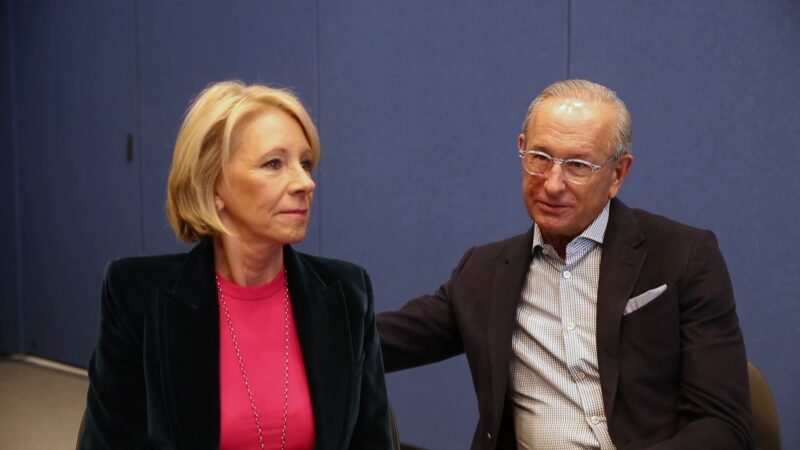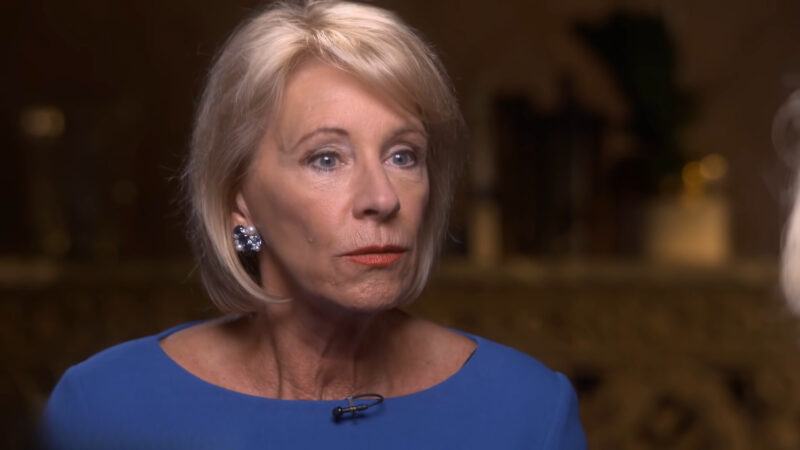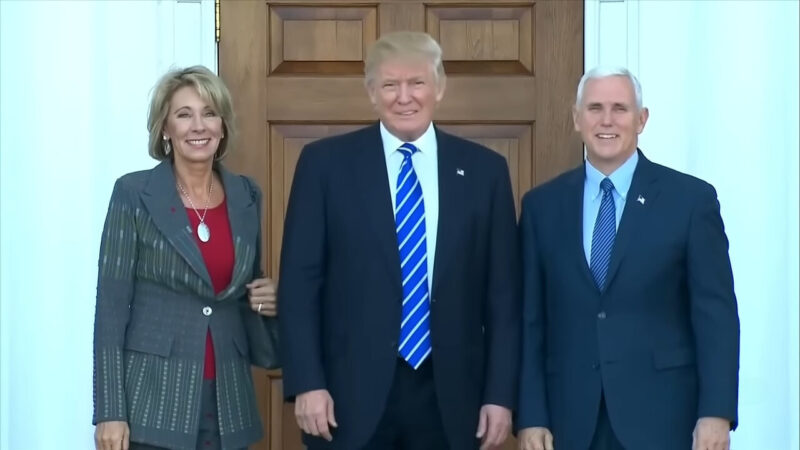Despite facing vigorous opposition and a lengthy confirmation process, Elisabeth “Betsy” DeVos was officially sworn in as the new Secretary of Education in February. DeVos now leads the Department of Education, an organization responsible for determining education policy and “ensuring equal access to education,” according to the department’s mission statement.
The 59-year-old DeVos was born and raised in Holland, Michigan. Since her 20s, she has been an active member of the Republican party but was never elected to office. The controversy during her confirmation process stemmed from Democrats—and even some Republicans—in Congress who opposed her nomination given that she has no prior background in education, though for decades she has supported and advocated school voucher programs and privatizing schools.
So, who is Betsy DeVos, and what will her impact be on career education? These are the two questions that could most affect career schools as well as higher education as we know it over the next four years. Here are a few important facts that shed some light on DeVos’ background and how she might change the course of education:
1. A wealthy family

DeVos is the daughter of the late Edgar Prince, a wealthy industrialist. Her brother is Erik Prince, founder of Blackwater. And, she is the wife of Dick DeVos, an entrepreneur and heir to the fortune of Amway founder Richard DeVos, valued at over $5 billion. Richard DeVos is also owner of the Orlando Magic. With her husband, she co-owns the Windquest Group, a technology investment firm where she serves as chair.
2. Faith-based beliefs
DeVos’ beliefs are tied to her deep roots in Christianity. The first college she attended was Holland Christian High School, a Christian Reformed school in the town where she grew up. After that, she attended Calvin College, a second Christian Reformed school in Michigan.
According to Politico, she has stated that her mission in the realm of education is to “advance God’s kingdom.” Like many other Christian conservatives, DeVos has supported Vice President Mike Pence, who helped advance school voucher programs in Indiana.
3. Education background

A major point of opposition voiced against DeVos is that she’s never served in a professional education position. Her career in academia did not include any studies in education. In fact, she has not attended or taught at any public schools or universities. Her background in education has primarily involved roles in philanthropy and political activism.
Democratic Sen. Al Franken of Minnesota hammered DeVos during the confirmation hearings, claiming that DeVos had no background in the educational field outside of attacking teachers’ unions.
He questioned her at length in a now famous exchange in which DeVos struggled to explain the relative advantage of doing assessments and using them to measure proficiency or to measure growth.
4. School choice supporter
For more than two decades, DeVos and her husband have made school choice their primary battle. After attending private schools herself and sending her children to private schools, DeVos has stated that she believes “educational choice” should be an option for every family. The phrase “educational choice” refers to efforts to privatize education by installing school voucher programs, ultimately driving public funds to private and religious schools.
In a 2013 interview, DeVos expressed support for vouchers, private schools, charter schools, homeschooling, and “digital learning” as viable options under educational choice. Absent from her list were public schools. DeVos has also stated publicly that the Detroit public school system should be replaced entirely with a free-market system.
In 2001, DeVos launched a political action committee called the Great Lakes Education Project (GLEP) to fund legislation and political candidates. According to the Detroit Free Press, the DeVoses have contributed $2 million to GLEP since its founding. Critics say that the GLEP has influenced policy outcomes in favor of Michigan’s charter industry growth.
DeVos chairs the American Federation for Children. Her other roles involve serving on the board of the Alliance for School Choice, the Education Freedom Fund, and the Foundation for Excellence in Education.
5. Supporter of career education?
Views of DeVos as a supporter of “for-profit” education come from her backing of charter schools, some of which are organized as for-profit businesses. Critics of DeVos speculate that she might deregulate career colleges and remove many guidelines for federal standards on postgraduate outcomes. In the past, DeVos has declined to endorse guidance for gainful employment and accountability standards for federal funding to institutions of all types. During the confirmation hearings, DeVos said vocational education was “a noble pursuit.”
While her support for career training does not necessarily mean she will put an end to the recent scrutiny facing career colleges, her comments could suggest the crackdown led by the Obama administration against the sector could be over. In her prepared remarks at the confirmation hearing, DeVos said, “We need to embrace new pathways of learning. For too long a college degree has been pushed as the only avenue for a better life. The old and expensive brick-mortar-and-ivy model is not the only one that will lead to a prosperous future.”
6. No common core
At a victory rally for President Donald Trump in Michigan last year, DeVos doubled down on her promise to end Common Core State Standards. Until then, there was much speculation around her position on Common Core given that she served on the board of the former Republican presidential contender Jeb Bush’s Foundation for Excellence in Education, which supported the controversial standards.
But her direct comments at the rally make her position on this subject clear: “I’m so excited and humbled to be nominated as secretary of education. Just between us, let me share this, it’s time to make education great again in this country. This means putting kids first every single day.
This means expanding choices and options to give every child the opportunity for a good education regardless of their ZIP code or their family circumstances. This means letting states set their own high standards and finally putting an end to the federalized common core.”
7. Political activism

From 1992-97, DeVos was Republican National Committeewoman for Michigan. Prior to that, she chaired the Republican Party in Michigan and then did so again from 1996 to 2000 and 2003 to 2005. And in 2006, her husband ran as the Republican candidate for Michigan governor.
During the campaign, he spent the most money anyone had ever spent on a gubernatorial campaign in the state. Even after setting a record for spending, he was defeated by the Democratic incumbent.
8. Deregulation
The DeVos family has contributed about $1.45 million to prevent Michigan from adding oversight for charter schools, according to nonprofit news organization Chalkbeat. DeVos and her husband have been longtime opponents of regulation. About 80 percent of the state’s charter schools are run by private companies.
The lack of oversight prompted concern from the Obama administration that some bad charters were being allowed to operate without improving or being forced to close. Civil rights groups like the NAACP have also expressed concern that low-income children and children of color suffer when oversight is scaled back.
Final Words
Elisabeth “Betsy” DeVos, as the Secretary of Education, brings a unique perspective to the role, with her strong advocacy for school choice and her faith-based beliefs. Her lack of professional education experience has been a point of contention, but her commitment to alternative education pathways, including career education and vocational training, could bring significant changes to the education landscape.
Her stance on deregulation and opposition to the Common Core State Standards also signal potential shifts in education policy. As with any new administration, the impact of these changes will unfold over time.






